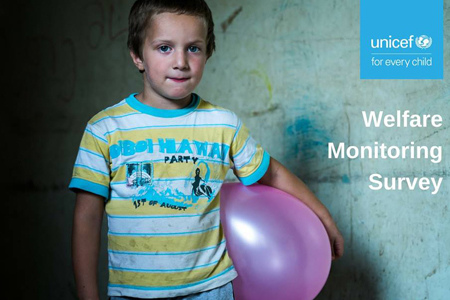UNICEF: Children remain most vulnerable group in Georgian society

Social protection programmes can better identify poor families with children, says UNICEF. Photo: UNICEF.
Agenda.ge, 12 Jun 2018 - 13:54, Tbilisi,Georgia
Social protection programmes can better identify poor families with children though poverty still remains a challenge in Georgia, UNICEF’s new Welfare Monitoring Survey says.
Targeting of social assistance increased and together with Child Benefit has a high impact on reducing child poverty; targeted social assistance can better identify poor households with children; poverty levels increased for all groups though people’s perception of being in poverty have improved; less people experience financial barriers in accessing health services; the gap for preschool attendance decreased; due to absence of kindergartens, around 14,000 children still do not attend preschool services” – these are some of the findings of the UNICEF’s Welfare Monitoring Study.
The Welfare Monitoring Study is a biennial household survey covering all the government-controlled regions of Georgia. The results for the 2017 round examined the prevalence and distribution of consumption poverty, material deprivation, subjective poverty and social exclusion.
Children still remain the most vulnerable group in Georgia’s society,” said Laila Omar Gad, UNICEF Representative in Georgia.
To reduce child poverty a comprehensive social protection system is needed and child benefits should be expanded in amount and in coverage. At the same time family support services and child care needs to be expanded in Georgia to support families with children”, she added.
The major findings of the Welfare Monitoring Study include:
- General poverty rates in the country increased and a lack of strong and inclusive economic growth, unemployment and increased consumer prices are likely reasons for increased poverty rates.
- People’s perception of being in poverty have improved most likely due to real increase in incomes.
- The average out of pocket expenditure on health increased and purchase of medicines remains the main component of healthcare spending.
- To cope with economic hardships more families resort to borrowing. Use of financial instruments (banks and pawn shops) considerably increased in poor families.
- The gap for the preschool attendance decreased for both urban/rural areas as well as for rich and poor.
- 6 out of 10 children aged 3-5 from poor families have no or insufficient access to children’s books.
- Every fifth child aged 15-18 from the poorest groups is no longer involved in the education.
 Tweet
Tweet  Share
Share